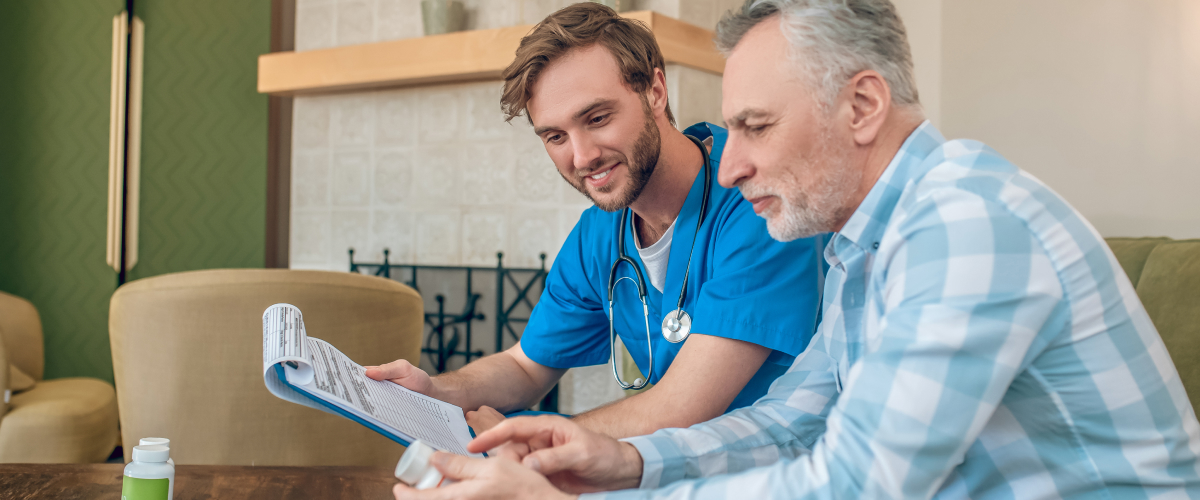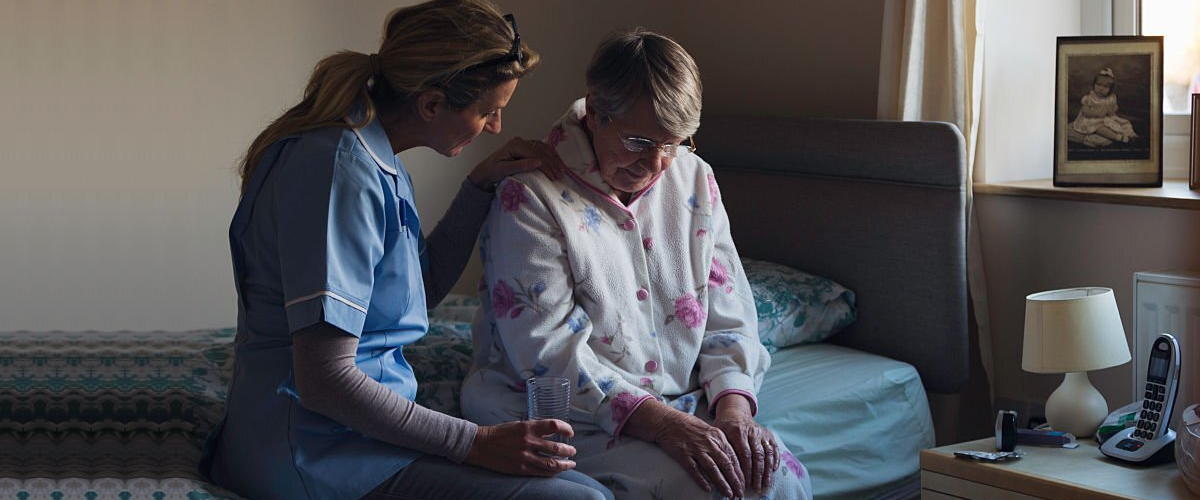Anxiety can be a challenging condition for older adults. In this article, we will delve into the causes of anxiety in elderly at night, the specific challenges, and effective strategies for managing nighttime anxiety to ensure seniors enjoy peaceful and restorative sleep.
Understanding Anxiety in Elderly at Night:
Anxiety is a natural response to stress, but for some elderly individuals, it can become more persistent and disruptive. It is a state of unease that may be accompanied by feelings of worry, fear, or nervousness. Seniors experiencing anxiety may find it challenging to relax, leading to restlessness, irritability, and difficulty concentrating.
Read More: How to Care for Seniors with Anxiety
Common Causes of Anxiety in Elderly at Night:
Understanding the underlying causes of anxiety is crucial to providing effective support. Several factors can contribute to anxiety in seniors at night, including:
- Health Concerns: Chronic health conditions, pain, or disabilities can increase anxiety levels.
- Life Transitions: Major life changes like retirement or the loss of a loved one can trigger anxiety.
- Medications: Some medications may have side effects that induce anxiety symptoms.
- Isolation: Seniors who feel socially isolated may be more prone to anxiety.
- Cognitive Decline: Deterioration in cognitive abilities can lead to heightened anxiety.
Symptoms of Anxiety in Elderly at Night:
Recognizing the signs of anxiety in older adults is essential for early intervention. Some common symptoms of anxiety include:
- Restlessness: Feeling on edge or unable to relax.
- Sleep Problems: Difficulty falling asleep or staying asleep.
- Physical Discomfort: Experiencing tension, headaches, or stomach issues.
- Irrational Fears: Having excessive worry about everyday situations.
- Memory Issues: Finding it hard to concentrate or recall information.

10 Effective Ways to Relieve Anxiety in Seniors
As experienced senior care professionals, we understand the challenges that anxiety can bring into the lives of older adults. Anxiety among seniors is a prevalent issue that requires careful attention and effective strategies to overcome. Here are ten proven ways to relieve anxiety in elderly at night and improve their overall well-being.
1. Engaging in Regular Physical Activity:
Encouraging seniors to engage in regular physical activity is a powerful approach to alleviating anxiety. Physical exercises release endorphins, the brain’s natural mood elevators, promoting a sense of relaxation and positivity. Gentle exercises like walking, yoga, and tai chi can significantly reduce stress levels and improve sleep patterns in seniors.
Read More: Chair Exercises for Seniors: Staying Active and Healthy
2. Social Support and Connection:
Maintaining social connections is vital for seniors’ mental health. Isolation and loneliness can exacerbate anxiety symptoms. Encouraging seniors to participate in community events, clubs, or support groups can provide them with a sense of belonging and emotional support.
3. Mindfulness and Meditation:
Practicing mindfulness and meditation techniques can be remarkably effective in reducing anxiety in seniors at night. Mindfulness helps seniors focus on the present moment, reducing worry about the past or future. Meditation promotes relaxation and helps seniors manage their anxious thoughts more effectively.
4. Balanced Diet and Nutrition:
A well-balanced diet plays a crucial role in supporting seniors’ mental health. Encourage a diet rich in fruits, vegetables, whole grains, lean proteins, and healthy fats. Limiting caffeine and alcohol intake can also help stabilize mood and reduce anxiety.
5. Seeking Professional Counseling:
When anxiety becomes overwhelming, seeking professional counseling can make a significant difference. Trained therapists can provide seniors with the tools to cope with anxiety, identify triggers, and develop personalized strategies for managing stress.
6. Cognitive Behavioral Therapy (CBT):
Cognitive Behavioral Therapy (CBT) is a widely recognized and effective treatment for anxiety in seniors. CBT focuses on changing negative thought patterns and behaviors, leading to reduced anxiety levels and improved emotional well-being.
7. Creative Outlets and Hobbies:
Engaging in creative activities and hobbies can be a therapeutic way for seniors to alleviate anxiety. Painting, crafting, gardening, or playing a musical instrument can divert their attention from worry and stress.
Read More: Best Summer Activities for Seniors
8. Pet Therapy:
Pet therapy, also known as animal-assisted therapy, has proven to be beneficial for seniors’ mental health. Spending time with animals can reduce feelings of loneliness and anxiety, offering comfort and companionship.
9. Limiting News and Media Exposure:
Excessive exposure to distressing news and media can heighten anxiety levels in seniors at night. Encourage seniors to limit their exposure to negative information and instead focus on uplifting and positive content.
10. Establishing Relaxation Techniques:
Teaching seniors relaxation techniques, such as deep breathing exercises and progressive muscle relaxation, can help them manage anxiety symptoms effectively. Regular practice of these techniques can contribute to a calmer and more relaxed state of mind.

How Family and Caregivers Can Help?
Support from family members and live-in caregivers plays a vital role in helping seniors manage anxiety at night. Here are some ways to provide assistance:
- Open Communication: Encourage open and non-judgmental communication to understand the senior’s concerns and fears better.
- Accompanying to Appointments: Accompany seniors to medical appointments to ensure they receive appropriate care and treatment.
- Medication Management: Assist in organizing and managing medications as prescribed by healthcare professionals.
- Participate in Relaxation Activities: Engage in relaxing activities together, such as meditation or gentle yoga.
- Promote Independence: Support and encourage seniors to maintain their independence, which can boost their confidence and reduce anxiety.
Conclusion:
In conclusion, anxiety in the elderly, especially at night, is a significant concern that can affect their overall well-being and sleep quality. Understanding the symptoms, causes, and effective management strategies is crucial for seniors to lead a fulfilling and anxiety-free life. By implementing the suggested approaches and providing unwavering support, family members and caregivers can help seniors cope with anxiety and enjoy their golden years with serenity and joy.
Want to Learn More?
ConsidraCare’s caregivers for seniors are trained to offer professional support and companionship to seniors. Please reach out to us at wecare@considracare.com or call us at 1-855-410-7971.
Frequently Asked Questions – FAQs:
Calming techniques like deep breathing, gentle reassurance, and engaging in soothing activities can help calm an elderly person with anxiety.
Sudden anxiety in elderly can be triggered by health changes, life transitions, medications, or stressful events.
Elderly individuals can experience various types of anxiety, including generalized anxiety, social anxiety, and specific phobias.
Natural ways to help anxiety in elderly include regular exercise, mindfulness, herbal teas like chamomile, and maintaining a supportive environment.
Anxiety can be managed naturally through lifestyle changes, relaxation techniques, and support, but a complete “cure” might depend on individual factors and severity




